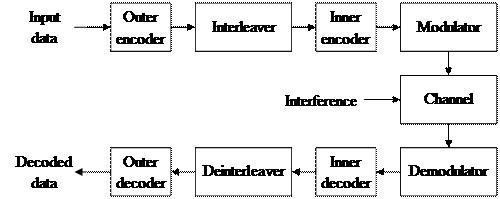
CATEGORIES:
BiologyChemistryConstructionCultureEcologyEconomyElectronicsFinanceGeographyHistoryInformaticsLawMathematicsMechanicsMedicineOtherPedagogyPhilosophyPhysicsPolicyPsychologySociologySportTourism
Concatenated codes
1.4.1 Serial concatenated encoding fundamentals
The important stage in development of encoding and decoding devices for reliable information noise protection is research and development of concatenated codes. Using together two or more correction codes is the concatenated encoding. The example of such encoding with using of two codes with the serial connection of encoders and decoders is shown in a fig. 1.11.
 |
Figure 1.11 Block diagram of serial concatenated code system
Block (n, k) codes are used more frequent as outer encoders, and convolutional as inner codes. The concatenated methods of encoding possess substantial advantages in comparison to many known methods of encoding when there is impulse noise in a telecommunication channel, resulting in bursts of errors. A fight against burst of errors is carried out with transposition of output bits of outer encoder, i.e. resorting of code symbols. Devices, executing these operations, are called interleavers. Deinterleavers do reverse operation in the input of outer decoder, i.e. restoration the order of the bits following.
In the real communication networks for data transmission as outer code is used Reed-Solomon (RS) code, which have maximal correcting ability with
dmin = n r + 1. For example, the RS (255, 223) code has minimum code distance dmin = 255 223 + 1 = 33, i.e. in code combination of 255 bits this code is able to correct tc  (33 1)/2 = 16 bits, received with errors. Convolutional codes with decoding using Viterbi algorithm are preferred for the inner code.
(33 1)/2 = 16 bits, received with errors. Convolutional codes with decoding using Viterbi algorithm are preferred for the inner code.
If information bits are coded by an outer code with dmin1, and inner with dmin2, minimum code distance of the formed concatenated code is determined as:
dmin1,2 = dmin1 × dmin2 (1.30)
Thats why concatenated codes have high correction ability.
Date: 2015-02-16; view: 1414
| <== previous page | | | next page ==> |
| Soft output Viterbi algorithm | | | Construction of interleaver and deinterleaver |